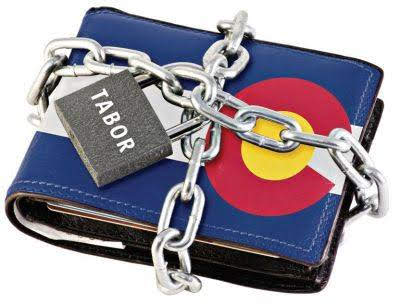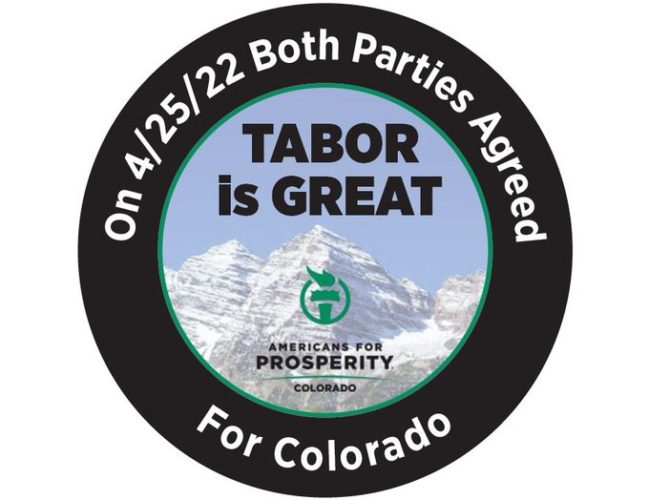#DontBeFooled
#ItsYourMoneyNotTheirs
#ThankGodForTABOR
#VoteOnTaxesAndFees
#FeesAreTaxes
#TABOR
#FollowTheMoney
#FollowTheLaw

#DontBeFooled
#ItsYourMoneyNotTheirs
#ThankGodForTABOR
#VoteOnTaxesAndFees
#FeesAreTaxes
#TABOR
#FollowTheMoney
#FollowTheLaw

#ItsYourMoneyNotTheirs
#ThankGodForTABOR
#VoteOnTaxesAndFees
#FeesAreTaxes
#TABOR
#FollowTheMoney
#FollowTheLaw

By Natalie Menten
Guest Commentary
The state government has taken more taxes from you than we allow it to have, and it should rebate that over-collection back to you. That money coming back to all taxpayers is now in jeopardy. We should be alarmed at the potential waste.
Colorado voters’ dissatisfaction with government growing beyond its means led to the passage of the Taxpayer’s Bill of Rights (TABOR). This constitutional amendment requires voter approval for tax increases and debt. It also limits how fast government can grow. The formula for automatic tax increases is the prior year’s budget plus adjustment for inflation and population growth.
When government collects taxes above the limit, it must refund the surplus. Later this year, each taxpayer will get a $750 TABOR rebate from the state. The economic outlook predicts rebates for the next several years.
Two statewide ballot measures in November claim they don’t raise taxes, but that’s just not true. Funding for new programs comes from our future TABOR rebates. If we don’t get all those rebates back, that’s effectively a higher tax rate and clearly a tax hike.
Click the link below to continue reading this article at the Denver Post.
Opinion: Statewide affordable housing program will cut into your TABOR refunds
Jefferson County is one of more than a dozen counties in Colorado that still enjoys the protections of the Taxpayer’s Bill of Rights (TABOR). This constitutional amendment requires voter approval for tax increases and debt. It also modestly limits how fast government can grow. The formula for automatic tax increases is the prior year’s budget plus adjustment for inflation and local growth.
Jefferson County government is presently allowed to grow 3.9% annually under the formula as described in a Board of County Commissioners agenda for July 19 (page 171). That’s a reasonable amount for government growth – compare it to your household. Have you gotten nearly a 4% increase in your income?
Yet, the county commissioners have spent the last few years claiming they have insufficient revenue to maintain operations. Now they blame the revenue problem on the pandemic, yet the county received close to a couple hundred million in COVID relief money.
That pile of federal money still didn’t calm down the county commissioners’ quest to get rid of our Taxpayer’s Bill of Rights.
To continue reading the rest of this story, please click (HERE) to go to Complete Colorado
#ItsYourMoneyNotTheirs
#ThankGodForTABOR
#VoteOnTaxesAndFees
#FeesAreTaxes
#TABOR
#FollowTheMoney
#FollowTheLaw

When I wake up in the morning at my home in Austin, Texas, I turn on the lights, and thereby provide a few cents to the city government’s electric company. I flush the toilet, owing a few more to Austin’s sewer service. When I pour myself a glass of water, the city water department gets a piece. After I get dressed and step outside, I watch the city take my trash, my recycling, and my compost—each pickup costs a few dollars. Sometimes, I discover a $25 ticket for parking my car in the wrong spot. Then I swallow my anger and drive down the MoPac highway, where I pay a toll to the Central Texas Regional Mobility Authority. I park in a garage downtown owned by the Austin Transportation Department, pay them a few bucks, and walk to my office. If I need to take a trip out of town, I pay $1.25 for a Capital Metro District bus to the city-owned Austin-Bergstrom International Airport, where, along with the price of my plane ticket, I pay a $5.60 fee for the benefit of being patted down by a TSA agent, a Passenger Facility Charge, and a small part in any rents the city charges restaurants and retailers. Only when I’m in the air does the drain to the government stop.
In one typical morning, I handed over money to several government bodies. But I didn’t pay any taxes—only fees, charges, and fines. These are the future of government in the United States.
The idea that government operates just by taxing and spending money is anachronistic. A growing share of its revenue comes from charges that the government imposes in exchange for its services or as a penalty for breaking its rules. In 1950, about 1 percent of Americans’ income went to charges from state and local governments. Today, that number is 4 percent. Include federal fees and charges, themselves the fastest-growing part of federal revenue, and that number rises to over 5.5 percent. Though largely hidden from the public, fees and charges account for most of the growth in government over the past 70 years and have become the top source of revenue for state and local governments.
Two factors drive this new reliance on special charges. First, governments are expanding the “businesses” they run—hospitals, universities, airports—and forcing users to pay more for them.
To continue reading this story, please click (HERE) to go to The City Journal.
Progressives want more from Colorado residential property taxes
 By Brad Hughes
By Brad Hughes
Some Colorado progressives are intrigued by a Bell Policy Center idea to increase property taxes on the wealthy to pay for subsidized housing for the poor. Colorado progressives frustrated that they could not eliminate TABOR, have been targeting property taxes as a source to expand government. The repeal of the Gallagher amendment was a big victory for them in pursuing increased residential property taxation. One of their proposals was to target residential real estate that exceeded $2 million in value. One proposal was to assess an additional 0.57% tax on homes valued at over $2 million. Another proposal was to establish a fee that was 1.1% on houses valued at over $2 million. Fortunately, both initiatives died. This doesn’t mean the idea is dead. It will be back for next year’s session.
Elizabeth Warren (D-MA) was quoted on Twitter as making a comparison between her proposed wealth tax and the traditional property tax. Addressing a crowd, she said: “You’ve been paying a wealth tax for years. They just call it a property tax. I just want their tax to include the diamonds, the yachts, and the Rembrandts.” Under current law, the first $250,000 ($500,000 for married couples) of capital gains on the sale of your primary residence are exempt from tax. Warren wants to create a wealth tax that would fall on the ownership of financial assets such as corporate stock or bonds. Many progressives at the national level like this idea. This will be difficult to accomplish when Americans learn about the magnitude of this taxation. A surtax on residential property in Colorado will be met with resistance if the electorate is informed.
The experiment with the wealth tax in Europe was a failure in many countries. France’s wealth tax contributed to the exodus of an estimated 42,000 millionaires between 2000 and 2012, among other problems. Emmanuel Macron, President of France, ultimately killed it.
In 1990, twelve countries in Europe had a wealth tax. Today, there are only three: Norway, Spain, and Switzerland. According to reports by the OECD and others, there were some clear themes with the policy: it was expensive to administer, it was hard on people with lots of assets but little cash, it distorted saving and investment decisions, it pushed the rich and their money out of the taxing countries—and, perhaps worst of all, it didn’t raise much revenue.1
The wealth tax idea was substantially influenced by the work of discredited French economist Thomas Piketty, whose book “Capital in the Twenty-First Century”, was focused on redistributing wealth in Europe.
Although a wealth tax will be difficult to impose in America, some states, like Colorado, are considering an increased surtax on residential property to accomplish their tax agenda and circumvent taxpayer opposition. It is important for Coloradans to support TABOR, and oppose surtaxes on residential property. Apathy and ignorance encourage the passions of radical progressivism. Stay tuned. The progressives will not give up until they lose elections.
Jefferson County is one of more than a dozen counties in Colorado that is still enjoys the protections of government revenue caps under the state’s Taxpayer’s Bill of Rights (TABOR) amendment. In years of excess revenue collection, the taxpayers traditionally benefit from this TABOR feature by a temporary property tax reduction. Unfortunately, County Commissioners Lesley Dahlkemper, Andy Kerr, and Tracy Kraft-Tharp didn’t want to issue the 2020 refunds in an efficient way, instead, they chose to spend $200,000 in postage to send $1.5 million dollars in rebate checks to residents.
The commissioners chose to unnecessarily spend that money so that they could then introduce a recently concluded promotional tour gauging feedback on whether they would be successful in eliminating all or parts of the TABOR revenue caps. County voters decidedly said no to a similar effort in 2019. In addition, they are polling meeting participants about an alternative sales tax increase.
The problem is that those who have read the county promotional literature and attended the meetings haven’t been given all the facts.
Click (HERE) to go to Complete Colorado to continue reading this story.

#ItsYourMoneyNotTheirs
#ThankGodForTABOR
#VoteOnTaxesAndFees
#FeesAreTaxes
#TABOR
#FollowTheMoney
#FollowTheLaw
#UnlessLiberalsIgnoreTheConstitution